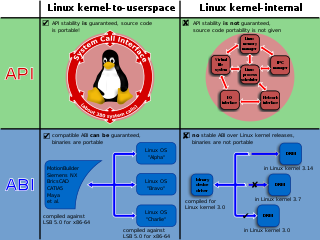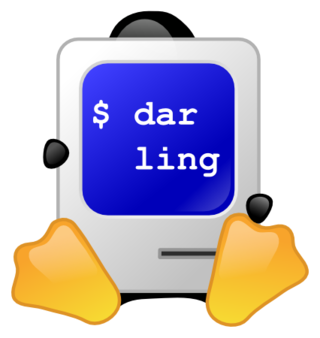
In computing, the Executable and Linkable Format, is a common standard file format for executable files, object code, shared libraries, and core dumps. First published in the specification for the application binary interface (ABI) of the Unix operating system version named System V Release 4 (SVR4), and later in the Tool Interface Standard, it was quickly accepted among different vendors of Unix systems. In 1999, it was chosen as the standard binary file format for Unix and Unix-like systems on x86 processors by the 86open project.

Wine is a free and open-source compatibility layer that aims to allow application software and computer games developed for Microsoft Windows to run on Unix-like operating systems. Wine also provides a software library, named Winelib, against which developers can compile Windows applications to help port them to Unix-like systems.

Solaris is a proprietary Unix operating system originally developed by Sun Microsystems. After the Sun acquisition by Oracle in 2010, it was renamed Oracle Solaris.
In computing, cross-platform software is computer software that is designed to work in several computing platforms. Some cross-platform software requires a separate build for each platform, but some can be directly run on any platform without special preparation, being written in an interpreted language or compiled to portable bytecode for which the interpreters or run-time packages are common or standard components of all supported platforms.
A computing platform or digital platform is an environment in which a piece of software is executed. It may be the hardware or the operating system (OS), even a web browser and associated application programming interfaces, or other underlying software, as long as the program code is executed with it. Computing platforms have different abstraction levels, including a computer architecture, an OS, or runtime libraries. A computing platform is the stage on which computer programs can run.
CodeWeavers is a company that sells a proprietary version of Wine called CrossOver for running Windows applications on macOS, ChromeOS and Linux. The company was founded in 1996 as a consultancy, eventually moving entirely over to Wine development and support.
In computing, binary translation is a form of binary recompilation where sequences of instructions are translated from a source instruction set to the target instruction set. In some cases such as instruction set simulation, the target instruction set may be the same as the source instruction set, providing testing and debugging features such as instruction trace, conditional breakpoints and hot spot detection.
Linux malware includes viruses, Trojans, worms and other types of malware that affect the Linux family of operating systems. Linux, Unix and other Unix-like computer operating systems are generally regarded as very well-protected against, but not immune to, computer viruses.
CrossOver is a Microsoft Windows compatibility layer available for Linux, macOS, and ChromeOS. This compatibility layer enables many Windows-based applications to run on Linux operating systems, macOS, or ChromeOS.
In software engineering, a compatibility layer is an interface that allows binaries for a legacy or foreign system to run on a host system. This translates system calls for the foreign system into native system calls for the host system. With some libraries for the foreign system, this will often be sufficient to run foreign binaries on the host system. A hardware compatibility layer consists of tools that allow hardware emulation.

Unix System V is one of the first commercial versions of the Unix operating system. It was originally developed by AT&T and first released in 1983. Four major versions of System V were released, numbered 1, 2, 3, and 4. System V Release 4 (SVR4) was commercially the most successful version, being the result of an effort, marketed as Unix System Unification, which solicited the collaboration of the major Unix vendors. It was the source of several common commercial Unix features. System V is sometimes abbreviated to SysV.
Borland Kylix is a compiler and integrated development environment (IDE) formerly sold by Borland, but later discontinued. It is a Linux software development environment based on Borland Delphi and Borland C++ Builder, which runs under Microsoft Windows. Continuing Delphi's classical Greek theme, Kylix is the name for an ancient Greek drinking cup. The closest supported equivalent to Kylix is the free Lazarus IDE package, designed to be code-compatible with Delphi. As of 2010 the project has been resurrected in the form of Delphi cross compiler for Mac and Linux, as shown in the Embarcadero's Delphi and C++ Builder roadmap. As of September 2011 with Kylix discontinued the framework for cross-platform development by Embarcadero is FireMonkey.

The Linux kernel provides several interfaces to user-space applications that are used for different purposes and that have different properties by design. There are two types of application programming interface (API) in the Linux kernel that are not to be confused: the "kernel–user space" API and the "kernel internal" API.
Wabi is a discontinued commercial software application from Sun Microsystems that implements the Windows Win16 API specification on Solaris and AIX; a version for Linux was also released by Caldera Systems. Wabi runs applications developed for Windows 3.1, Windows 3.11, and Windows for Workgroups.
Binary-code compatibility is a property of a computer system, meaning that it can run the same executable code, typically machine code for a general-purpose computer CPU, that another computer system can run. Source-code compatibility, on the other hand, means that recompilation or interpretation is necessary before the program can be run on the compatible system.

A Unix-like operating system is one that behaves in a manner similar to a Unix system, although not necessarily conforming to or being certified to any version of the Single UNIX Specification. A Unix-like application is one that behaves like the corresponding Unix command or shell. Although there are general philosophies for Unix design, there is no technical standard defining the term, and opinions can differ about the degree to which a particular operating system or application is Unix-like.

Darling is a free and open-source macOS compatibility layer for Linux. It duplicates functions of macOS by providing alternative implementations of the libraries and frameworks that macOS programs call. This method of duplication differs from other methods that might also be considered emulation, where macOS programs run in a virtual machine. Darling has been called the counterpart to WINE for running macOS apps.
WINE@Etersoft is a Microsoft Windows compatibility layer available for Linux and FreeBSD. This compatibility layer enables many Windows-based applications to run on Linux operating systems, or FreeBSD.






